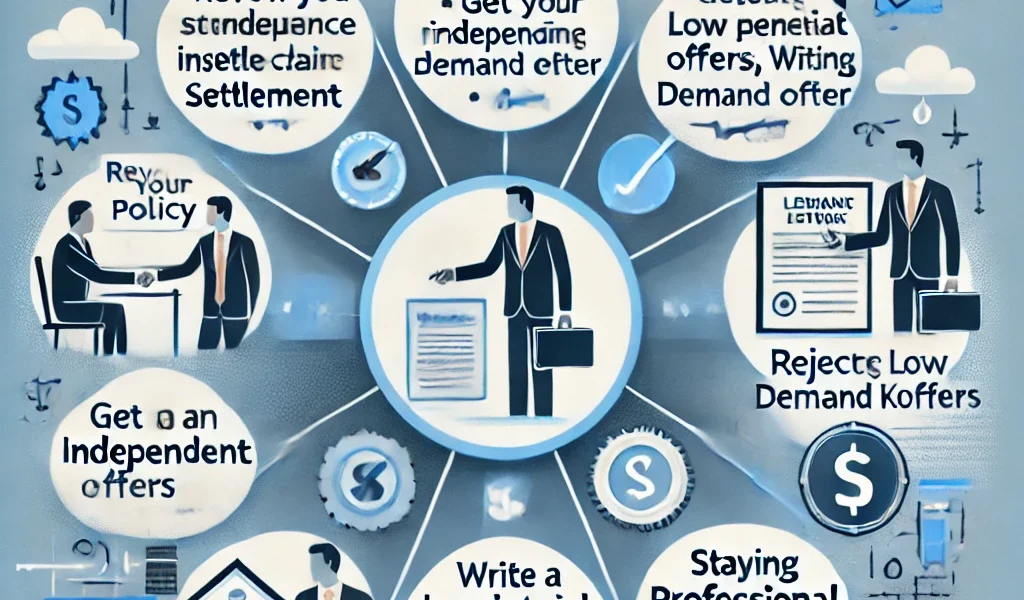Filing an insurance claim is only the first step in getting compensated for your losses. Many policyholders accept the first settlement offer from their insurer without realizing they can negotiate for a better payout. If you believe the initial offer does not fairly cover your damages, you have the right to negotiate. This guide will provide practical steps to help you maximize your insurance settlement while staying within legal and ethical boundaries.
1. Understand Your Insurance Policy
Before negotiating, familiarize yourself with your insurance policy. This ensures you know what you are entitled to and prevents the insurer from misleading you about your coverage.
Steps to Take:
- Review your policy’s terms, including coverage limits, exclusions, and deductibles.
- Understand how your insurer calculates settlements.
- Identify any clauses that may work in your favor.
2. Gather Strong Evidence
A strong claim backed by solid evidence increases your chances of getting a higher settlement.
What You Need:
- Photographs and videos of the damages.
- Receipts, repair estimates, or medical bills related to the claim.
- Police reports (if applicable).
- Witness statements to support your claim.
3. Get an Independent Damage Assessment
Insurance adjusters work for the insurer and may undervalue your damages. An independent assessment can provide an unbiased valuation.
What You Can Do:
- Hire a licensed contractor or appraiser to assess property damage.
- Get a second medical opinion for health-related claims.
- Compare independent estimates with the insurer’s offer.
4. Don’t Accept the First Offer
Insurance companies often make low initial offers to minimize payouts. If you accept too soon, you may lose the chance for a better settlement.
How to Respond:
- Politely decline the first offer and ask for a detailed explanation of how they arrived at the amount.
- Highlight discrepancies between their offer and your documented expenses.
- Make a counteroffer based on your research.
5. Provide a Well-Written Demand Letter
A demand letter serves as your official request for a higher settlement. It should clearly outline your losses, evidence, and justification for a higher payout.
Key Elements of a Demand Letter:
- A summary of the incident and damages.
- A detailed breakdown of expenses and financial losses.
- Supporting documents such as repair estimates, medical bills, or expert evaluations.
- A counteroffer amount and reasons for requesting it.
6. Stay Professional and Persistent
Negotiation requires patience and professionalism. Losing your temper or making unreasonable demands can work against you.
Best Practices:
- Keep all communication in writing.
- Remain calm and polite during discussions.
- Follow up regularly if you don’t get a timely response.
7. Use Legal and Regulatory Knowledge to Your Advantage
Understanding consumer protection laws and insurance regulations can give you leverage in negotiations.
How to Use This to Your Benefit:
- Research your state’s insurance laws and bad faith practices.
- Mention relevant laws if you suspect the insurer is acting unfairly.
- Consider consulting a lawyer if your claim is being unfairly denied.
8. Be Prepared to Escalate the Claim
If negotiations don’t lead to a fair settlement, you may need to escalate the claim.
Escalation Options:
- Request a supervisor review your case.
- File a complaint with the insurance regulatory authority.
- Seek mediation or arbitration.
- Consider legal action as a last resort.
Final Thoughts
Negotiating an insurance claim settlement doesn’t have to be intimidating. By understanding your policy, gathering strong evidence, and staying persistent, you can improve your chances of receiving a fair payout. Always remain professional and be prepared to escalate your claim if necessary.



